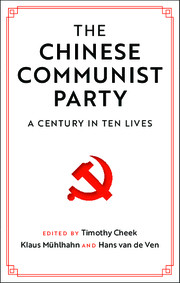Book contents
- Reviews
- The Chinese Communist Party
- The Chinese Communist Party
- Copyright page
- Contents
- Illustrations
- About the Contributors
- Acknowledgments
- Timeline of the Chinese Communist Party
- Map of China Today
- Introduction
- Chapter 1 – 1920s
- Chapter 2 – 1930s
- Chapter 3 – 1940s
- Chapter 4 – 1950s
- Chapter 5 – 1960s
- 5 The 1960s
- Chapter 6 – 1970s
- Chapter 7 – 1980s
- Chapter 8 – 1990s
- Chapter 9 – 2000s
- Chapter 10 – 2010s
- Afterword
- Appendix Selected Further Readings
- Notes
- Index
- References
5 - The 1960s
Wang Guangmei and Peach Garden Experience
from Chapter 5 – 1960s
Published online by Cambridge University Press: 06 May 2021
- Reviews
- The Chinese Communist Party
- The Chinese Communist Party
- Copyright page
- Contents
- Illustrations
- About the Contributors
- Acknowledgments
- Timeline of the Chinese Communist Party
- Map of China Today
- Introduction
- Chapter 1 – 1920s
- Chapter 2 – 1930s
- Chapter 3 – 1940s
- Chapter 4 – 1950s
- Chapter 5 – 1960s
- 5 The 1960s
- Chapter 6 – 1970s
- Chapter 7 – 1980s
- Chapter 8 – 1990s
- Chapter 9 – 2000s
- Chapter 10 – 2010s
- Afterword
- Appendix Selected Further Readings
- Notes
- Index
- References
Summary
Chapter 5 focuses on the 1967 Cultural Revolution campaign against Wang Guangmei, wife of the disgraced former PRC president Liu Shaoqi. A detailed firsthand account of Wang’s emblematic and theatrical mass struggle session at Tsinghua University introduces the story, followed by background to provide context for her poor treatment, and the larger political developments which led to Wang and Liu’s ultimate downfall. These include Wang’s early elite education as scientist, her work as an interpreter for the Chinese Communist Party’s underground in Beijing, and her eventual reassignment to Yan’an and role in the land-reform movement of 1947. The extreme violence of this earlier period contrasts with leading role in the implementation of the Four Cleans campaign in rural Hebei as part of the larger Socialist Education movement in the early 1960s. Her experience with exposing allegations of cadre malfeasance in the Peach Garden Brigade of Funing County ultimately provided a model for a nationwide anticorruption campaign, with Mao’s encouragement. The chapter concludes with a discussion of the violent backlash against the top-down work-team approach of the Four Cleans, advocated by Liu Shaoqi and Wang, in favor of the more chaotic bottom-up Red Guard approach of the Cultural Revolution that brought them down.
Keywords
- Type
- Chapter
- Information
- The Chinese Communist PartyA Century in Ten Lives, pp. 91 - 124Publisher: Cambridge University PressPrint publication year: 2021
References
Primary Sources
Secondary Sources
- 11
- Cited by

